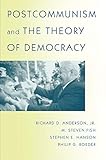Postcommunism and the Theory of Democracy / Philip G. Roeder, Stephen E. Hanson, M. Steven Fish, Richard D. Anderson.
Material type: TextPublisher: Princeton, NJ : Princeton University Press, [2021]Copyright date: ©2002Description: 1 online resource (216 p.) : 13 tables, 2 line illusContent type:
TextPublisher: Princeton, NJ : Princeton University Press, [2021]Copyright date: ©2002Description: 1 online resource (216 p.) : 13 tables, 2 line illusContent type: - 9780691230948
- POLITICAL SCIENCE / International Relations / General
- Akaev, Askar
- Aliev, Geidar
- Atatürk, Kemal
- Belarus: autocracy in
- Berisha, Sali
- Bova, Russell
- Bruckner, Scott
- Burbulis, Gennadi
- Chernomyrdin, Viktor
- Constantinescu, Emil
- Czechoslovakia: parliamentarism of
- Diamond, Larry
- Eckstein, Harry
- Edelman, Murray
- Estonia, selectorate in postcommunist
- Fish, M. Steven
- Fox, Vicente
- Fukuyama, Francis
- Geis, Michael
- Goncz, Arpad
- Gunther, Richard
- Henry, Patrick
- Higley, John
- Ivengar, Shanto
- Jasray, Puntsagiyn
- Karimov, Islam
- Kebich, Vyacheslau
- Kravchuk, Leonid
- Kuchma, Leonid
- Landsbergis, Vytautas
- Lipset, Seymour Martin
- Luong, Pauline Jones
- Meciar, Vladimir
- Mokrzycki, Edmund
- Nabiev, Rakhmon
- Nehru, Jawaharlal
- Ochirbat, Punsalmaagiyn
- Ordeshook, Peter
- Pakulski, Jan
- Petrocik, John
- Przeworski, Adam
- Rowen, Henry S
- Sartori, Giovanni
- Shevardnadze, Eduard
- Snegur, Mercea
- Stinchcombe, Arthur
- Ter Petrosian, Levon
- Tilly, Charles
- Van Dijk, Teun
- individualism
- individuality
- polyarchy
- online - DeGruyter
| Item type | Current library | Call number | URL | Status | Notes | Barcode | |
|---|---|---|---|---|---|---|---|
 eBook
eBook
|
Biblioteca "Angelicum" Pont. Univ. S.Tommaso d'Aquino Nuvola online | online - DeGruyter (Browse shelf(Opens below)) | Online access | Not for loan (Accesso limitato) | Accesso per gli utenti autorizzati / Access for authorized users | (dgr)9780691230948 |
Frontmatter -- CONTENTS -- CONTRIBUTORS -- LIST OF TABLES AND FIGURES -- ACKNOWLEDGMENTS -- ONE Introduction -- TWO The Rejection of Authoritarianism -- THREE The Dynamics of Democratic Erosion -- FOUR The Discursive Origins of Russian Democratic Politics -- FIVE Defining Democratic Consolidation -- six Conclusion: Postcommunism and the Theory of Democracy -- NOTES -- REFERENCES -- INDEX
restricted access online access with authorization star
http://purl.org/coar/access_right/c_16ec
Why did the wave of democracy that swept the former Soviet Union and Eastern Europe starting more than a decade ago develop in ways unexpected by observers who relied on existing theories of democracy? In Postcommunism and the Theory of Democracy, four distinguished scholars conduct the first major assessment of democratization theory in light of the experience of postcommunist states. Richard Anderson, Steven Fish, Stephen Hanson, and Philip Roeder not only apply theory to practice, but using a wealth of empirical evidence, draw together the elements of existing theory into new syntheses. The authors each highlight a development in postcommunist societies that reveals an anomaly or lacuna in existing theory. They explain why authoritarian leaders abandon authoritarianism, why democratization sometimes reverses course, how subjects become citizens by beginning to take sides in politics, how rulers become politicians by beginning to seek popular support, and not least, how democracy becomes consolidated. Rather than converging on a single approach, each author shows how either a rationalist, institutionalist, discursive, or Weberian approach sheds light on this transformation. They conclude that the experience of postcommunist democracy demands a rethinking of existing theory. To that end, they offer rich new insights to scholars, advanced students, policymakers, and anyone interested in postcommunist states or in comparative democratization.
Mode of access: Internet via World Wide Web.
In English.
Description based on online resource; title from PDF title page (publisher's Web site, viewed 24. Aug 2021)


